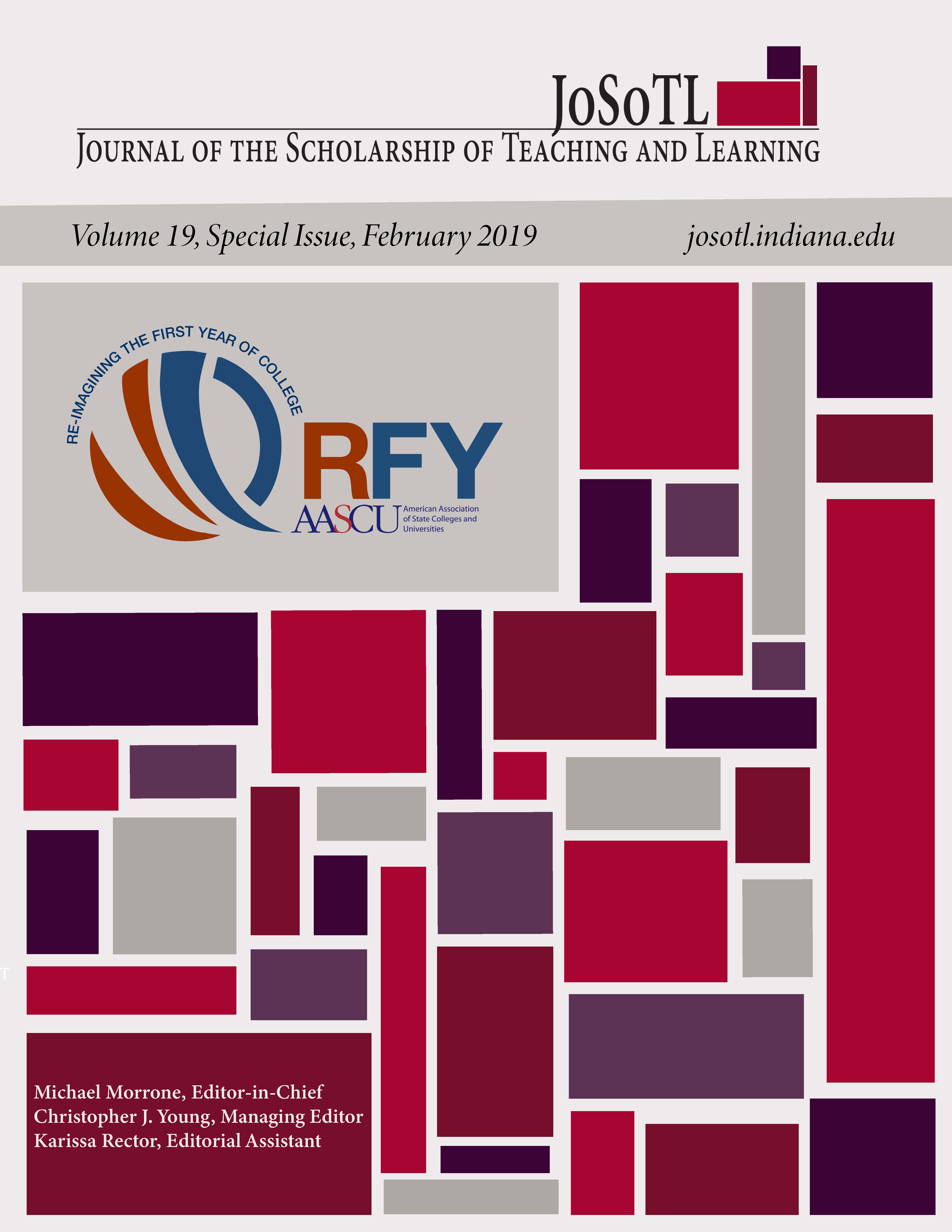Curricular Learning Communities and Retention
Main Article Content
Abstract
Learning communities have been a part of the higher educational landscape since the 1980s. Despite their widespread use, research regarding their effectiveness with enhancing retention is sparse. This study describes a freshmen curricular learning community linking courses required for all business majors. Retention for students taking courses in a curricular learning community is compared to retention for students taking the same courses independent from a learning community. Analysis of the data indicates that students who participated in the learning community were twice as likely to persist to the following semester than the students in the baseline comparison group. The results provide evidence that purposeful structuring of courses in a curricular learning community with support imbedded to help students succeed is associated with improved retention.
Downloads
Article Details
- Authors retain copyright and grant the Journal of the Scholarship of Teaching and Learning (JoSoTL) right of first publication with the work simultaneously licensed under a Creative Commons Attribution License, (CC-BY) 4.0 International, allowing others to share the work with proper acknowledgement and citation of the work's authorship and initial publication in the Journal of the Scholarship of Teaching and Learning.
- Authors are able to enter separate, additional contractual agreements for the non-exclusive distribution of the journal's published version of the work (e.g., post it to an institutional repository or publish it in a book), with an acknowledgement of its initial publication in the Journal of the Scholarship of Teaching and Learning.
- In pursuit of manuscripts of the highest quality, multiple opportunities for mentoring, and greater reach and citation of JoSoTL publications, JoSoTL encourages authors to share their drafts to seek feedback from relevant communities unless the manuscript is already under review or in the publication queue after being accepted. In other words, to be eligible for publication in JoSoTL, manuscripts should not be shared publicly (e.g., online), while under review (after being initially submitted, or after being revised and resubmitted for reconsideration), or upon notice of acceptance and before publication. Once published, authors are strongly encouraged to share the published version widely, with an acknowledgement of its initial publication in the Journal of the Scholarship of Teaching and Learning.
References
Barefoot, B., Gardner, J., Cutright, M., Morris, L, Schroeder, C., Siegel, M. & Swing, R. (2005). Achieving and Sustaining Institutional Excellence for the First Year of College. San Francisco: JosseyBass.
Carrino, S. and Gerace, W. (2016). Why STEM learning communities work: The development of psychosocial learning factors through social interaction. Learning Communities Research and Practice 4 (1): Article 3.
Cox, M.D. (2004). Introduction to faculty learning communities. In M.C. Cox & L. Richlin (Eds.), Building Faculty Learning Communities, New Directions for Teaching and Learning 97 (Spring).
DeAngelo, L. (2014). Programs and practices that retain students from the first to second year: Results from a national study. New Directions for Institutional Research 160 DOI: 10.1002/ir.20061
Dewey, J. (1933). How We Think. Lexington, MA: Heath.
Hill, W. and Woodward, L. (2013). Examining the impact of learning communities have on college of education students on an urban campus. Journal of College Student Development 54 (6): 643648.
Hosmer, D., Lemeshow, S. and Sturdivant, R. (2013). Applied Logistic Regression (3rd ed.). John Wiley and Sons.
Inkelas, K., Daver, Z., Vogt, K. & Leonard, J. (2007). Living-learning programs and first-generation college students’ academic and social transition to college. Research in Higher Education 48 (4): 403-433.
Kilgo, C., Sheets, J. & Pascarella, E. (2015). The link between high-impact practices and student learning: Some longitudinal evidence. Higher Education 69: 509-525.
Lenning, O., & Ebbers, L. (1999). The powerful potential of learning communities: Improving education for the future. ASHE-ERIC Higher Education Report 26 (6).
Meiklejohn, A. (1932). The Experimental College. New York: Harper Collins.
Pike, G., Kuh, G. & McCormick, A. (2011). An investigation of contingent relationships between learning community participation and student engagement. Research in Higher Education 52: 300-322.
Rocconi, L. (2011). The impact of learning communities on first year students’ growth and development in college. Research in Higher Education 52: 178-193.
Smith, B.L, Macgregor, J., Matthews, R.S. & Gablenick, F. (2004). Learning Communities: Reforming Undergraduate Education. San Francisco: Josey Bass.
Taylor, K. with Moore, W., MacGregor, J. and Lindblad, J. (2003). Learning Community Research and Assessment: What We Know Now. National Learning Communities Project Monograph Series. Olympia, WA: The Evergreen State College, Washington Center for Improving the Quality of Undergraduate Education.
Tinto, V. (2000). Learning better together: The impact of learning communities on student success. Journal of Institutional Research 9 (1): 48-53.
Tinto, V. (2006). Research and practice of student retention: What next? Journal of College Student Retention 8 (1): 1-19.
Tinto, V. (2012a). Completing College: Rethinking Institutional Action. Chicago, IL: University of Chicago Press.
Tinto, V. (2012b). Moving from theory to action: A model of institutional action for student success. In A. Seidman (Ed.), College Student Retention: Formula for Student Success (2nd ed.). Lanham, MD: Rowman and Littlefield Publishers.
Zhao, C. & Kuh, G. (2004). Learning communities and student engagement. Research in Higher Education 45: 115-138.
